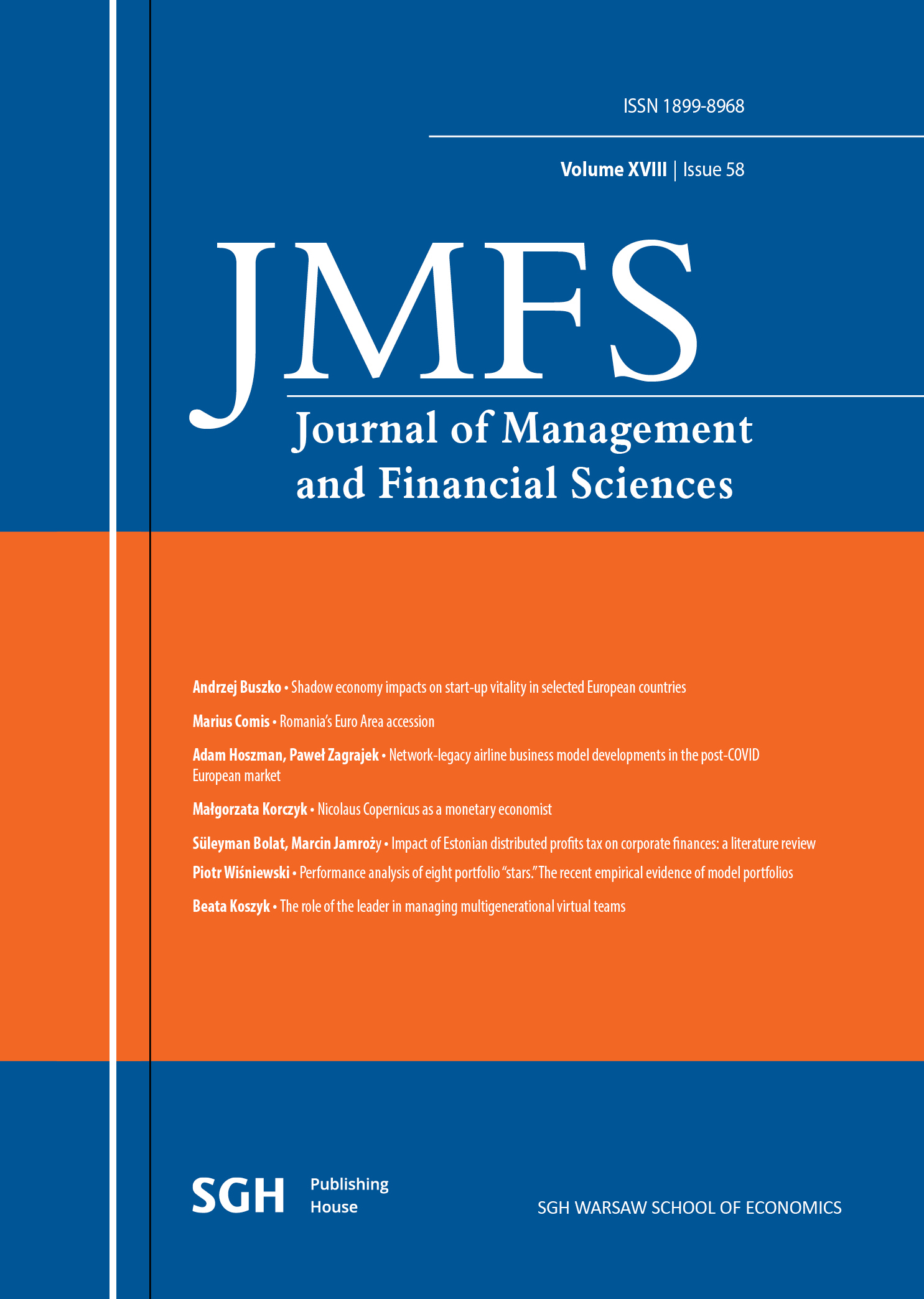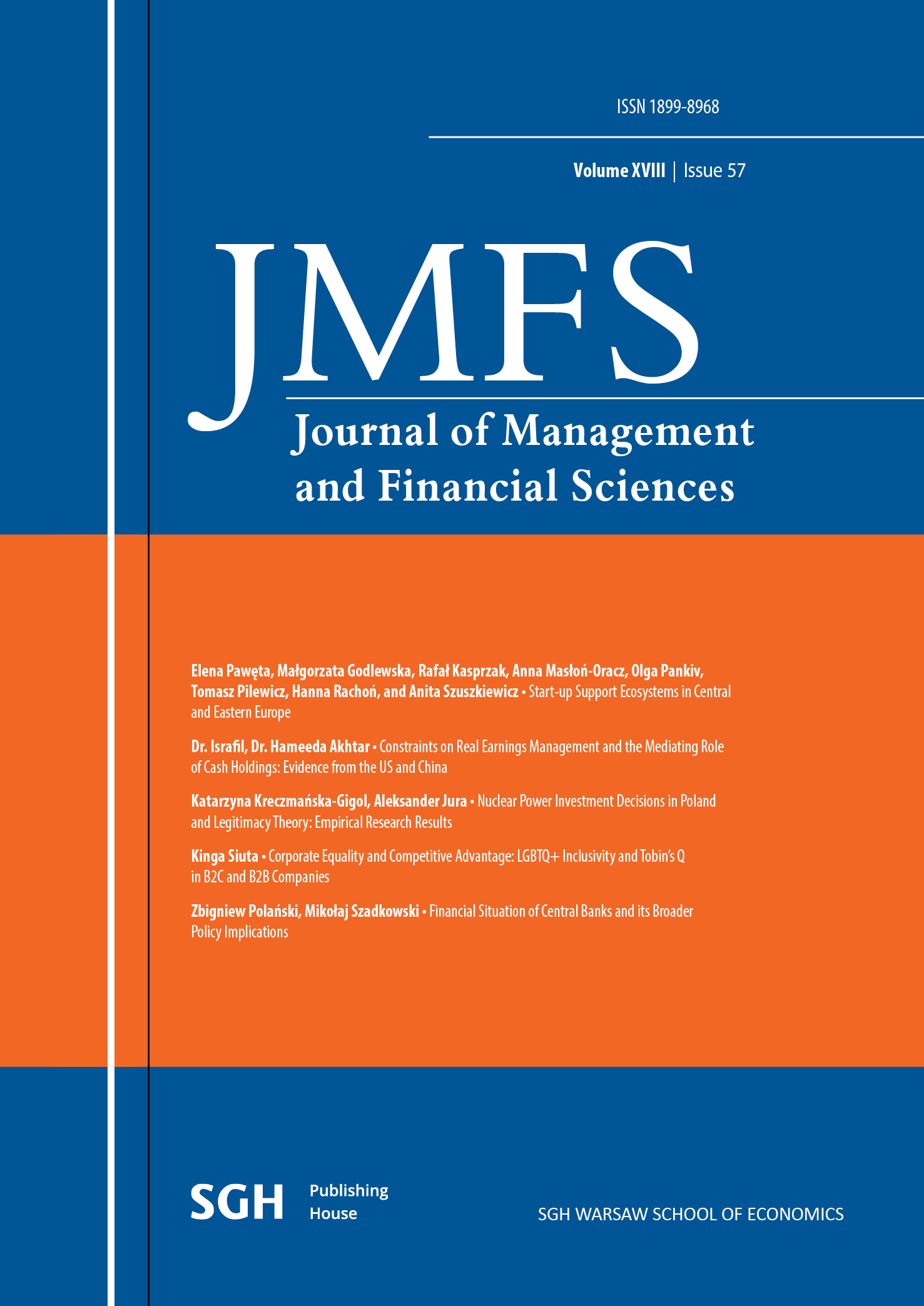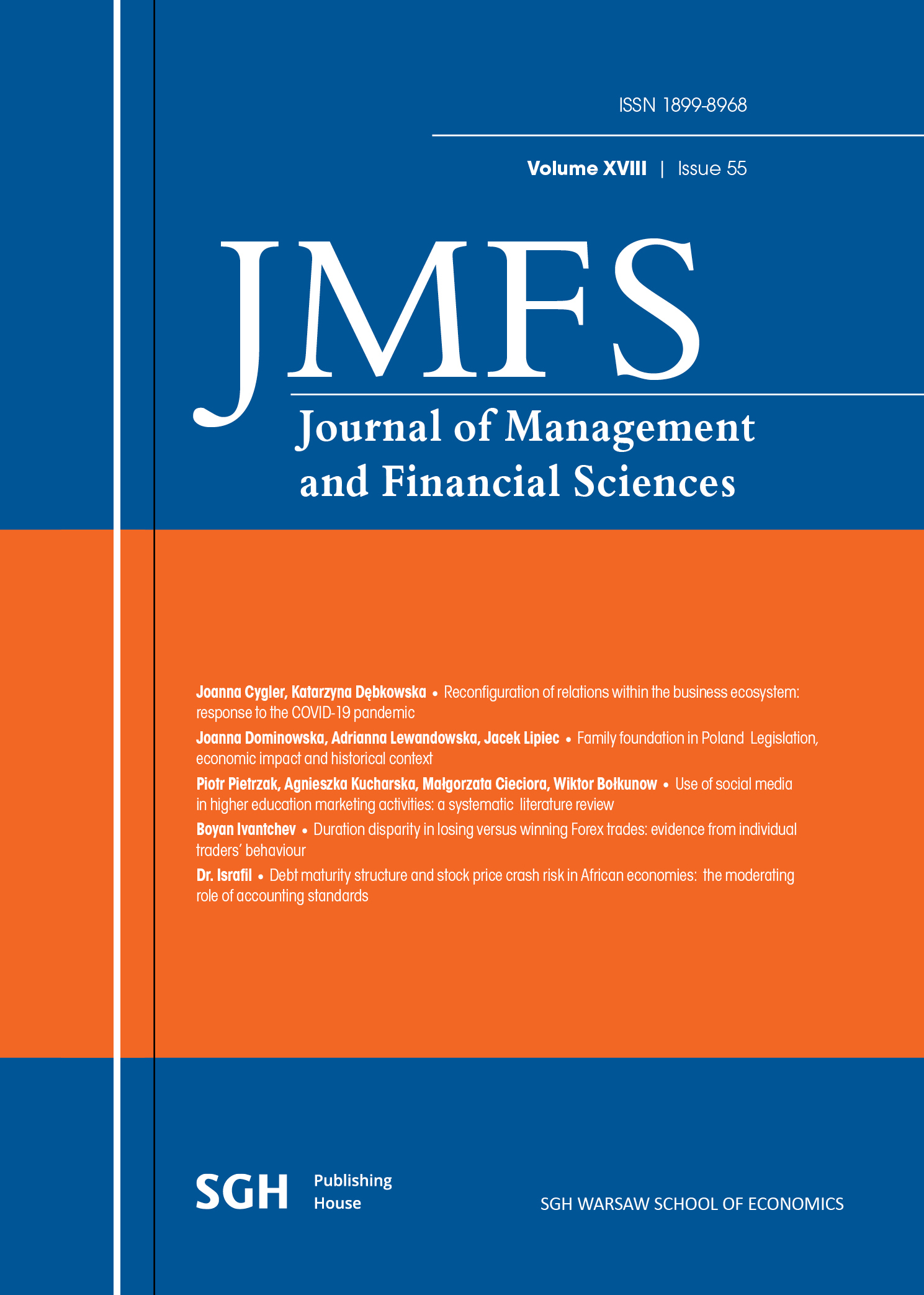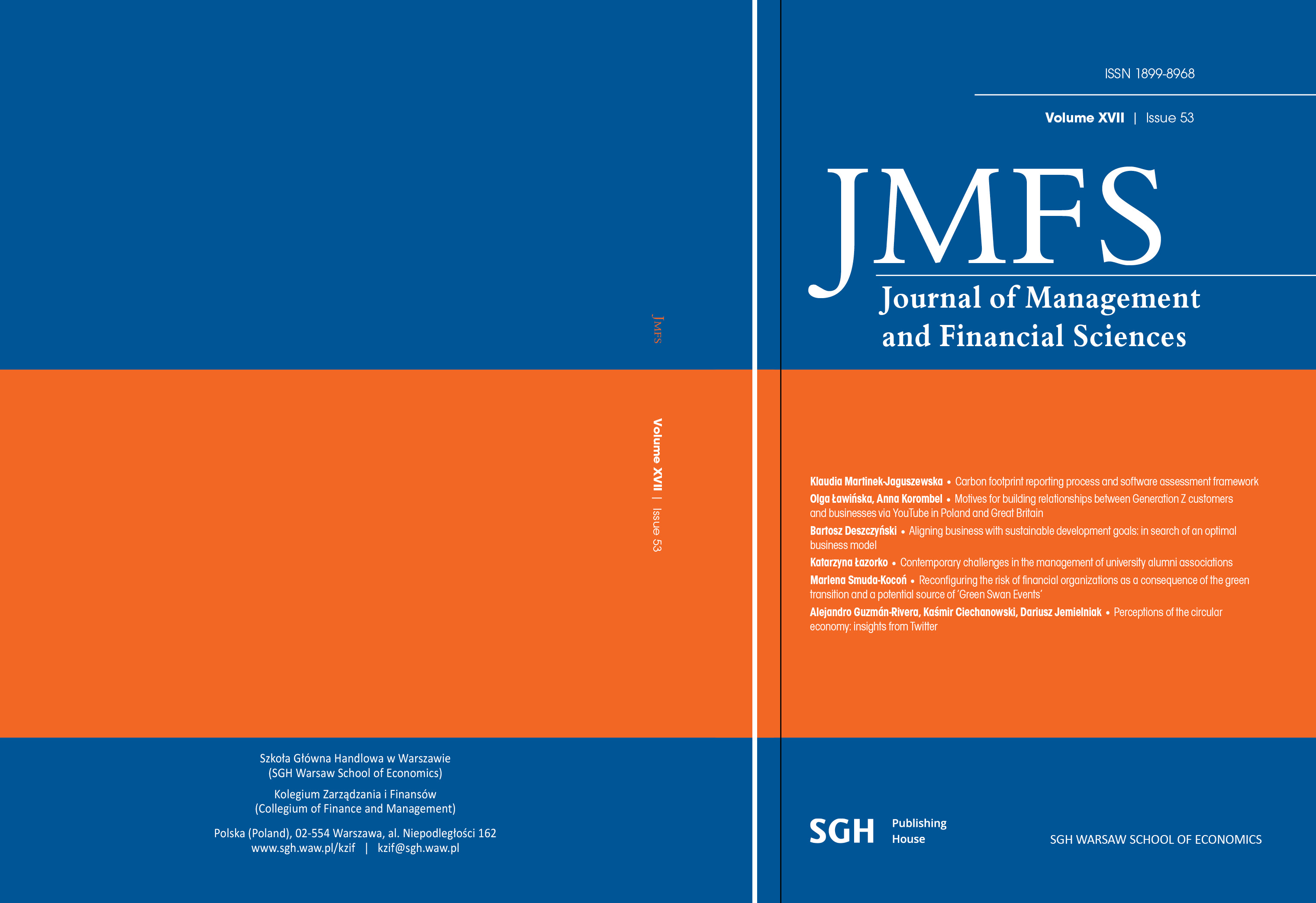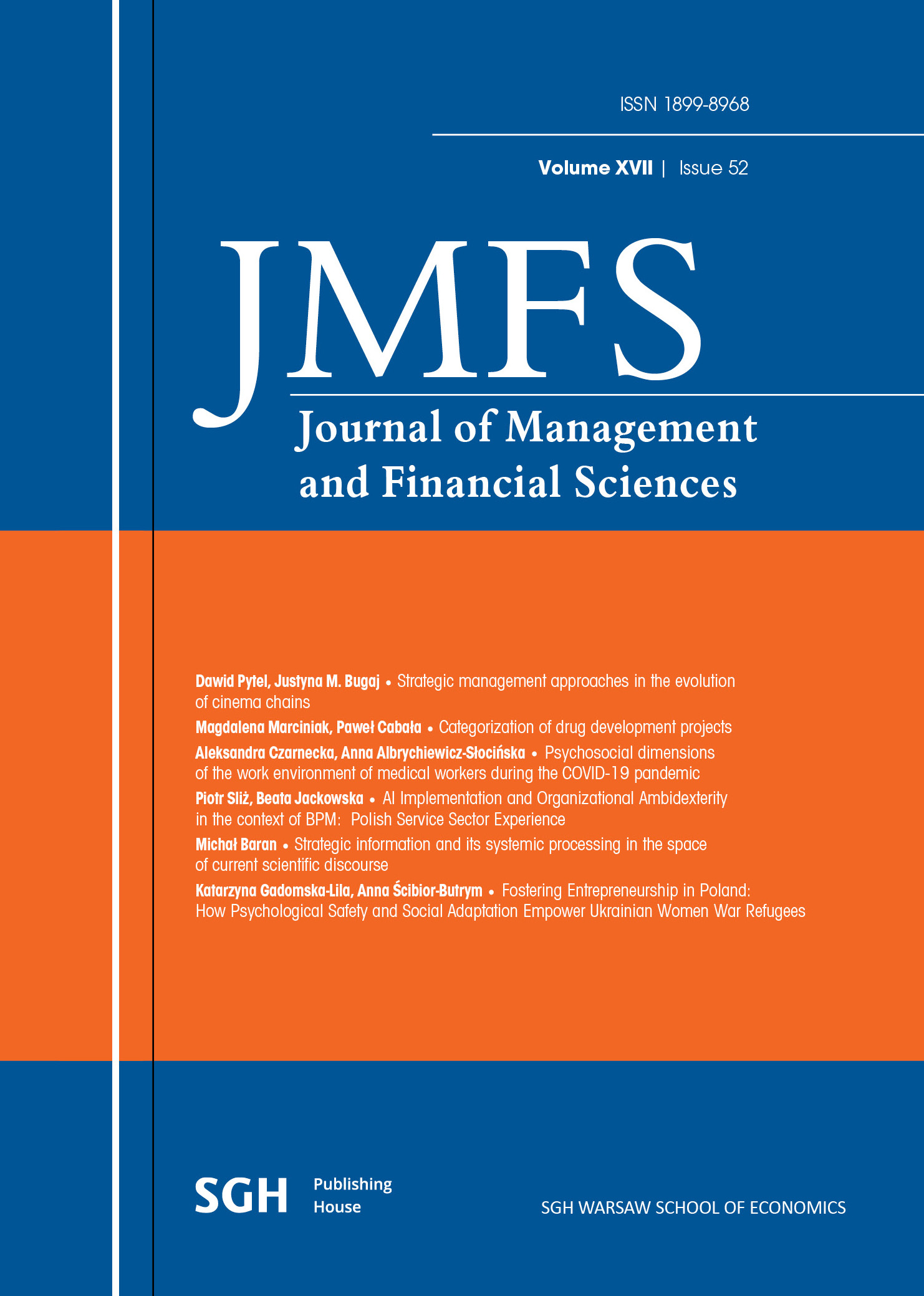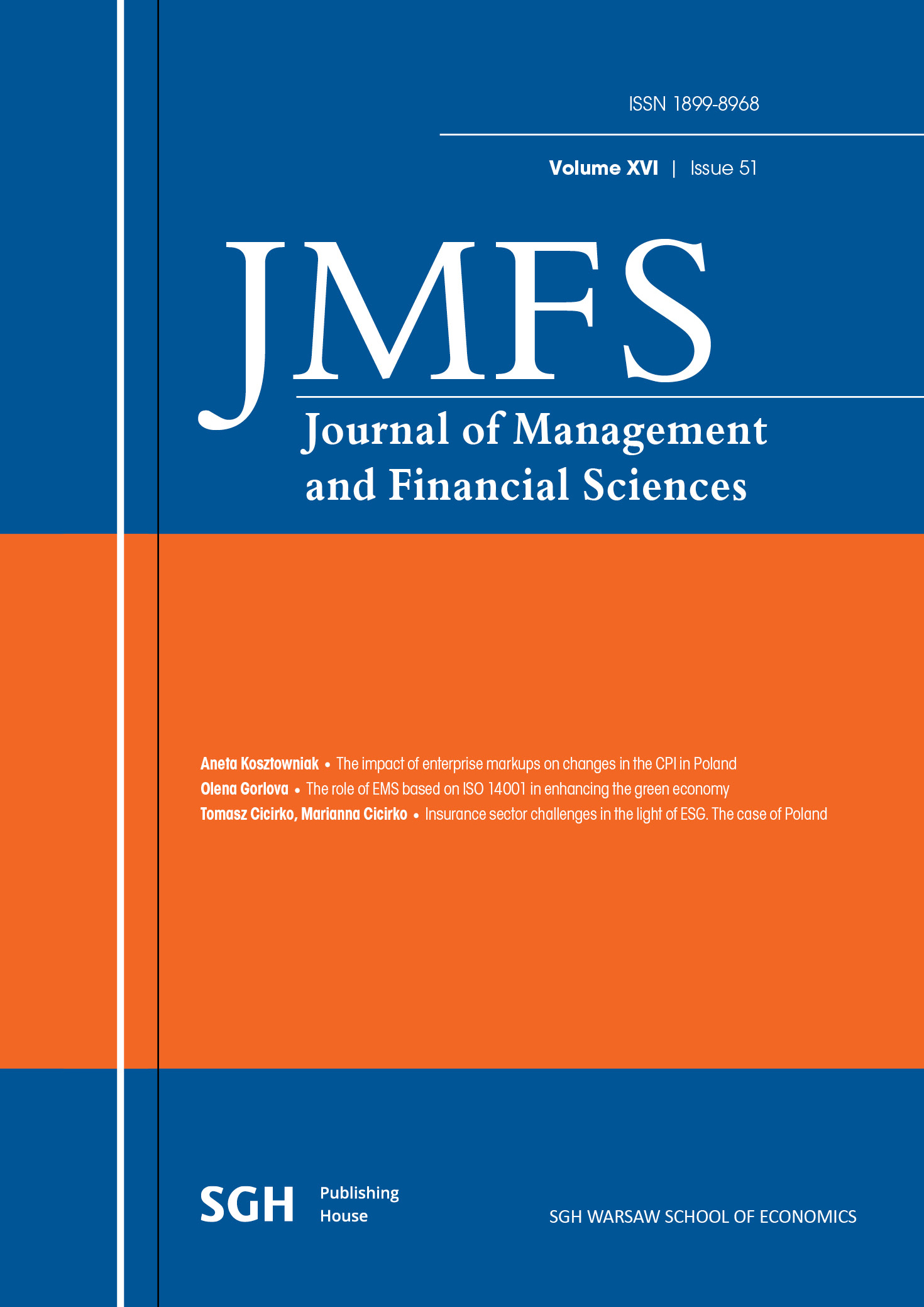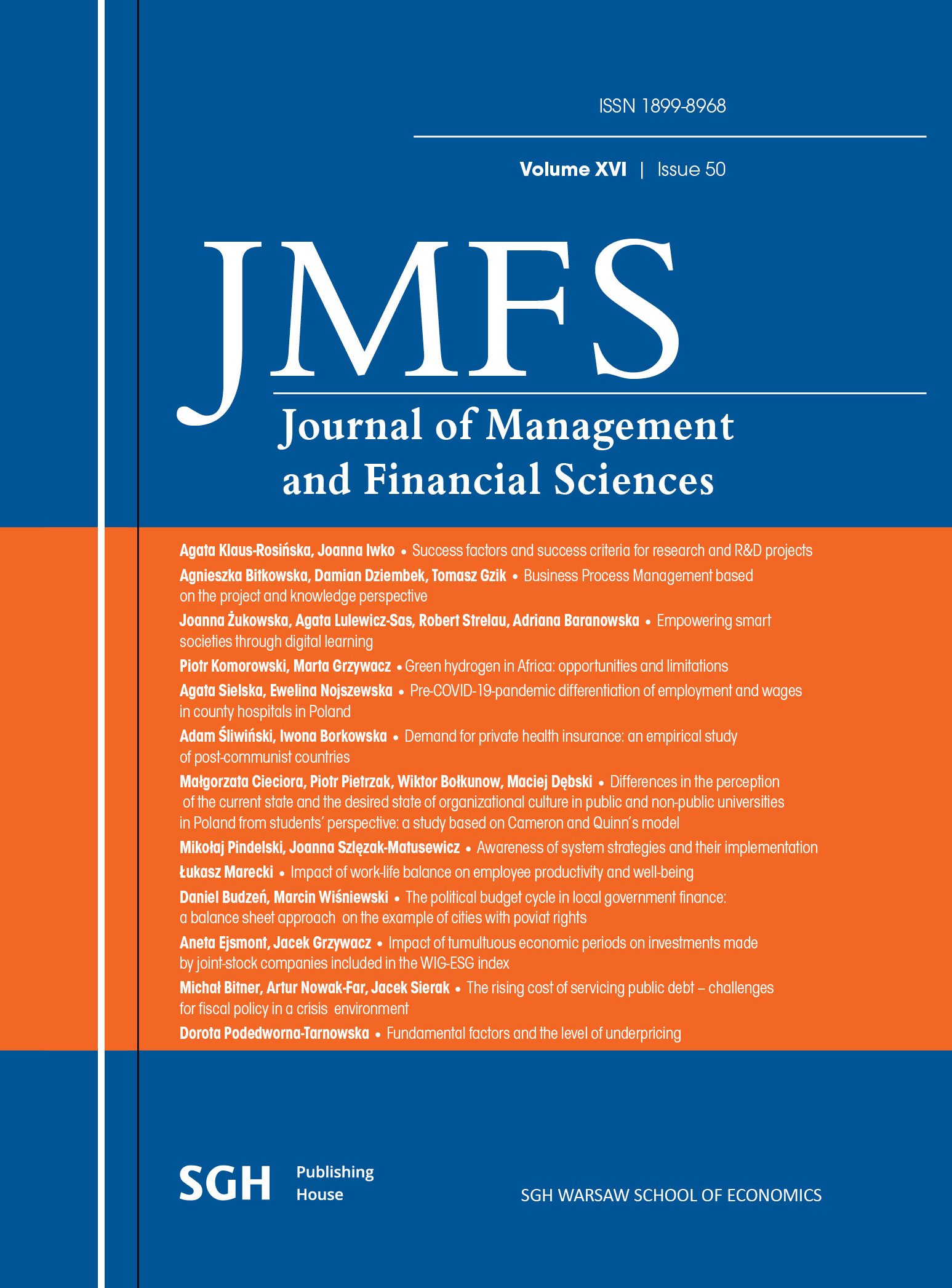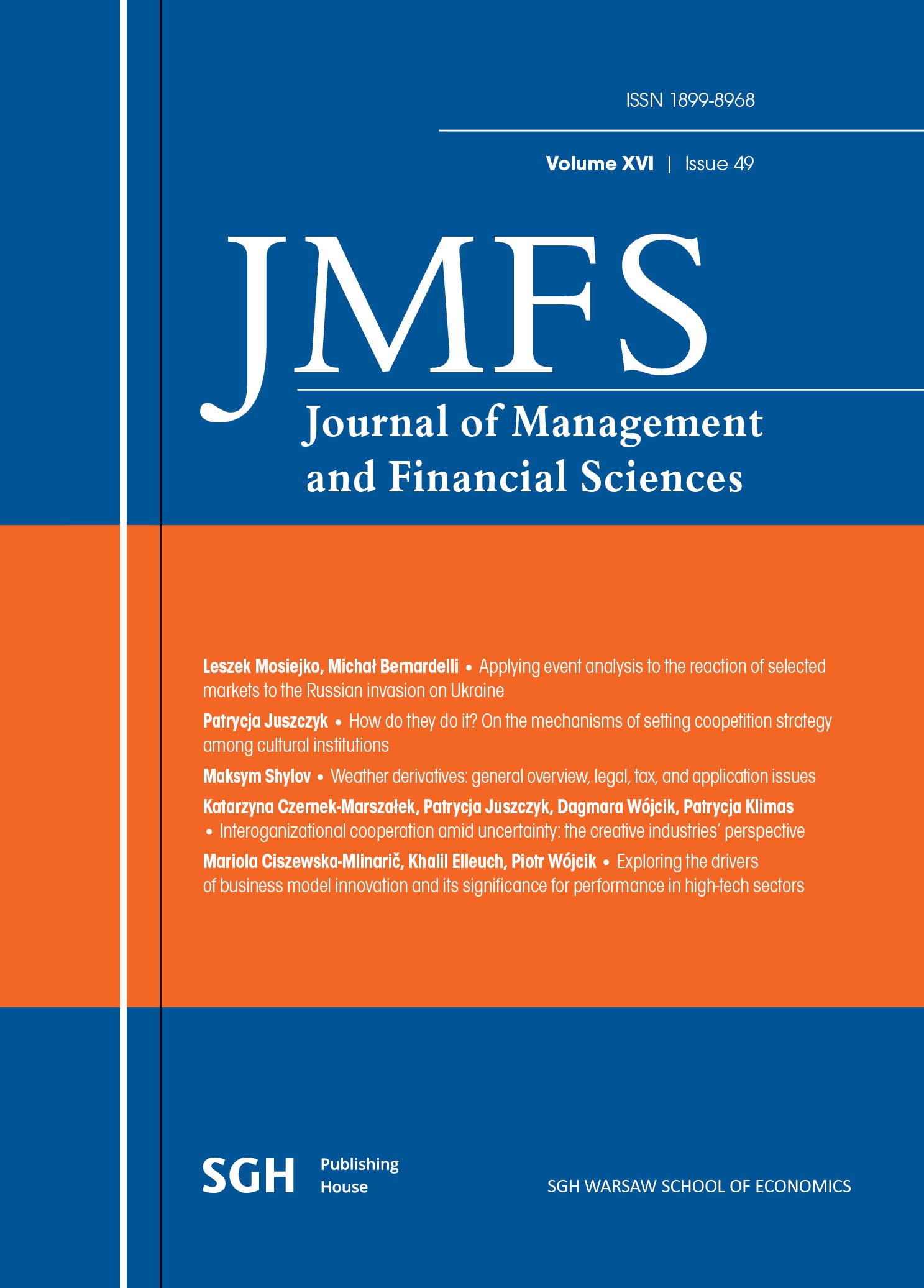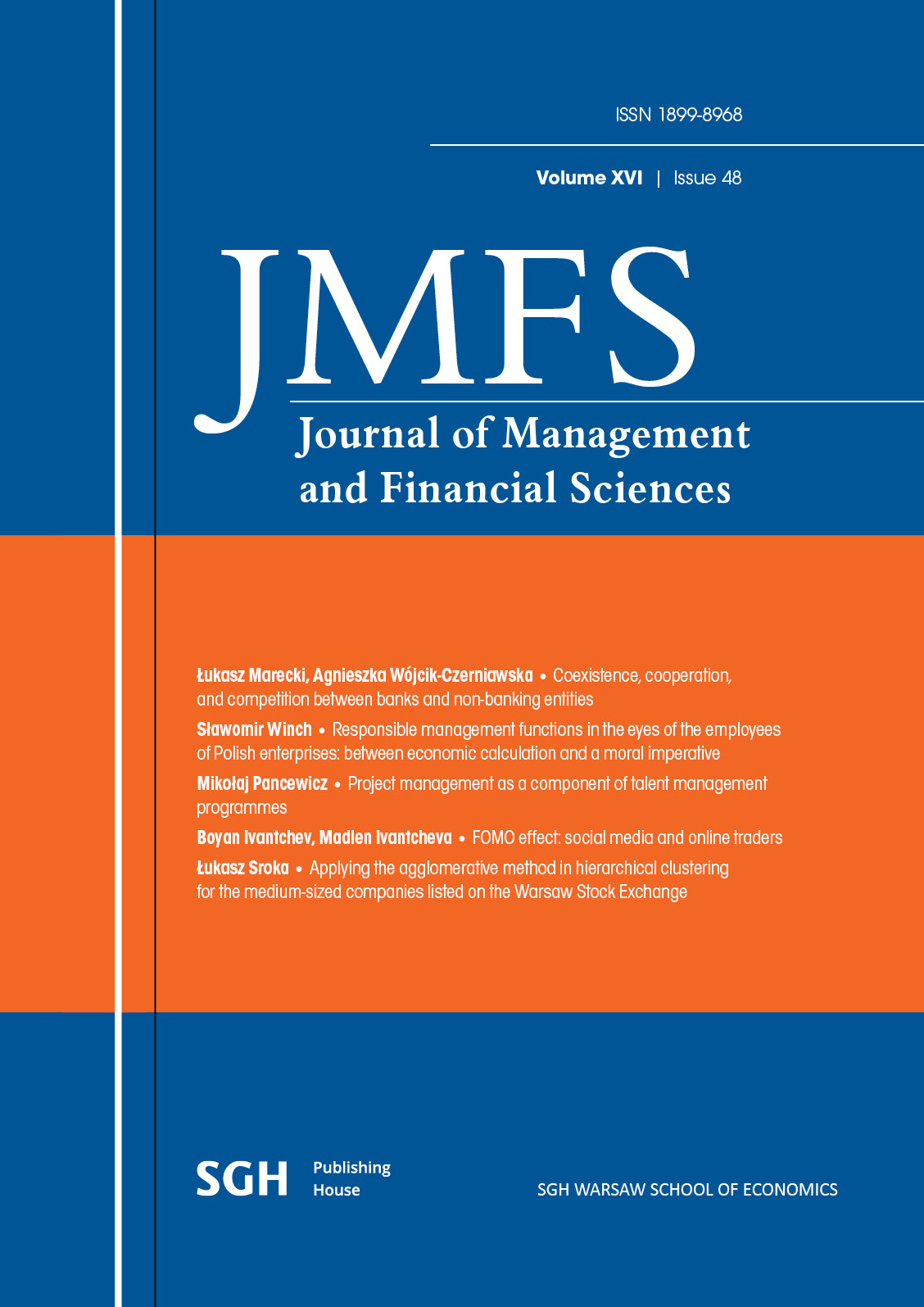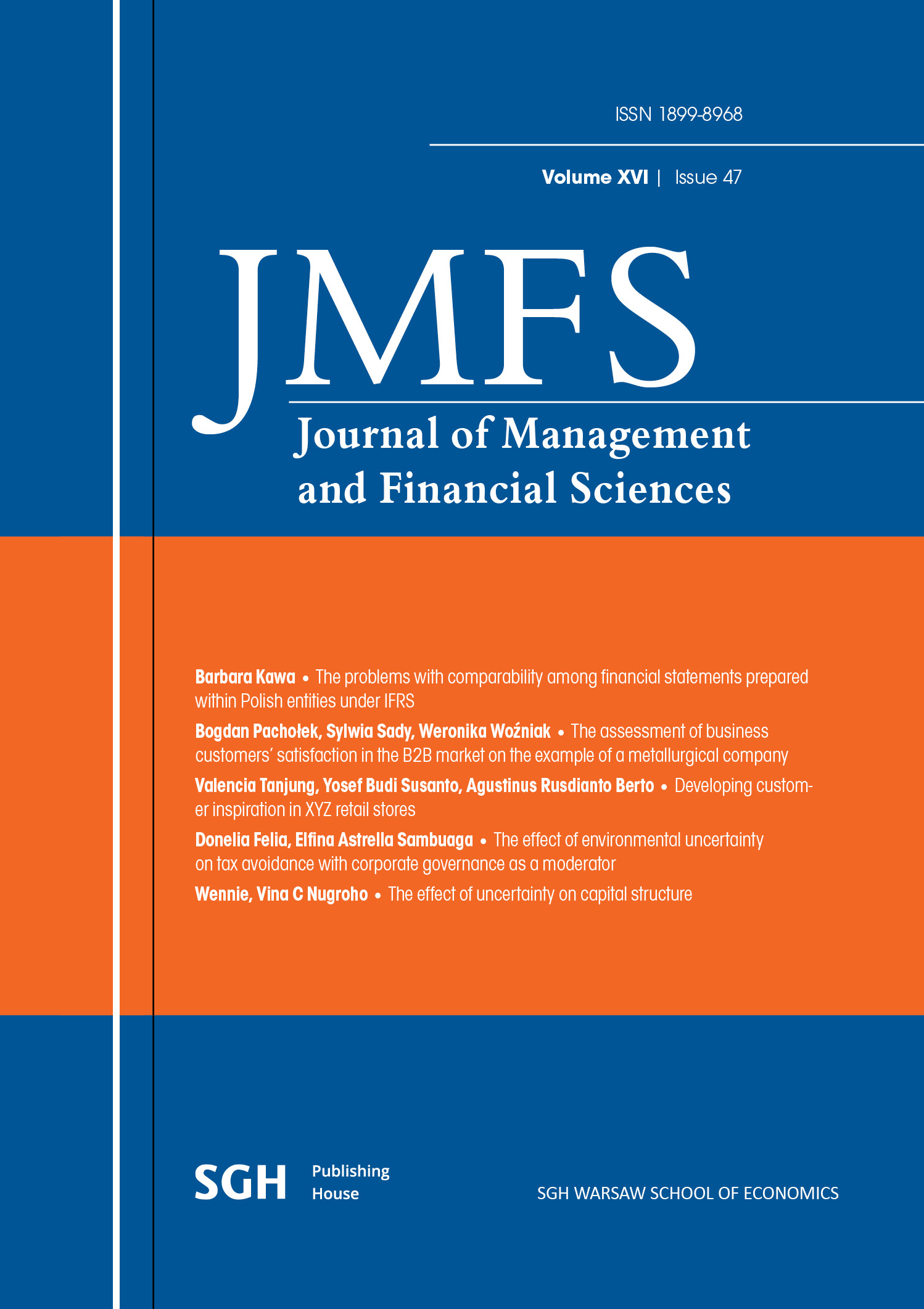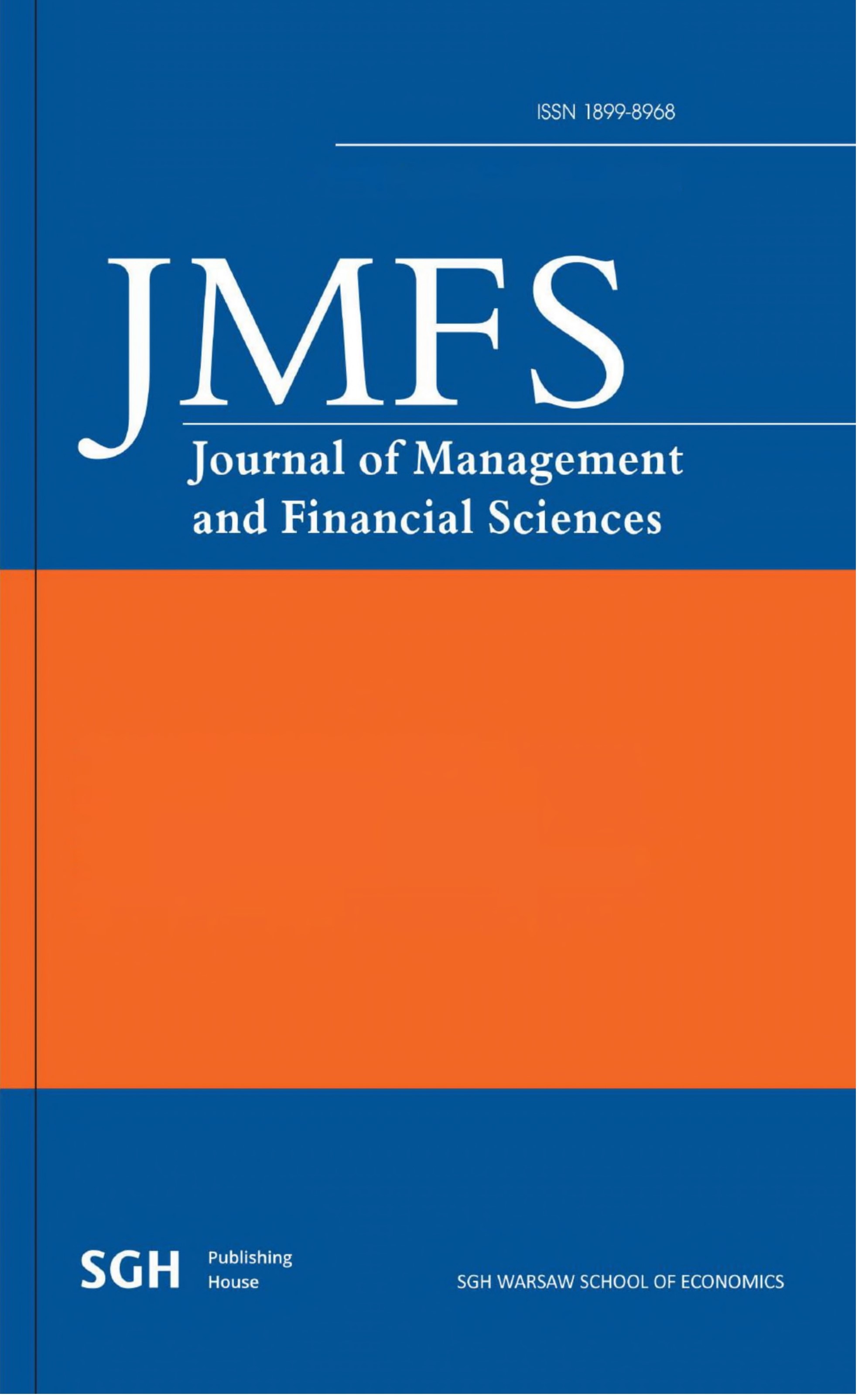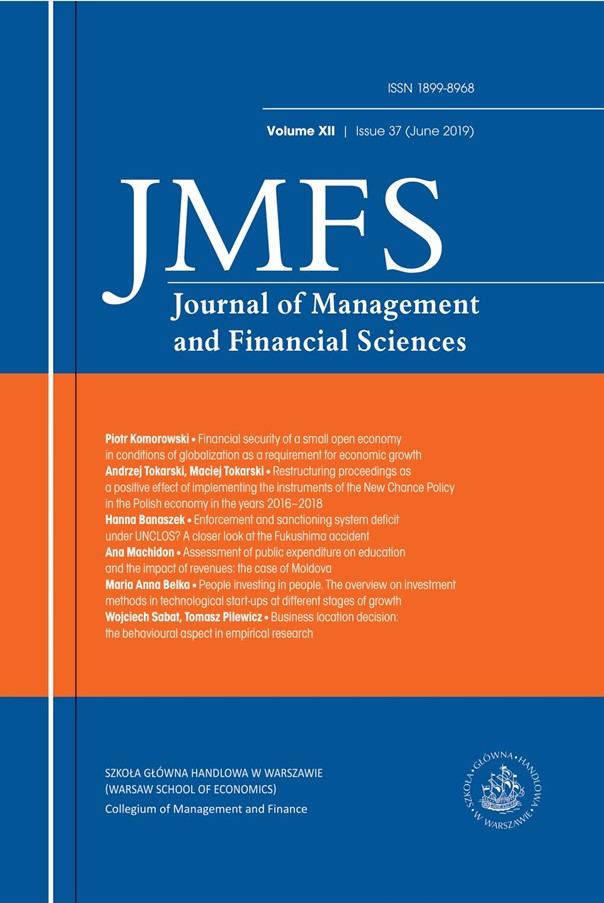Journal of Management and Financial Sciences
No. 58 (2025)
Dear Reader,
We present to you the latest 58th issue of the Journal of Management and Financial Sciences, which highlights innovative research in the fields of management and finance. The topics covered in this issue are of immense importance to both the academic community and business practitioners, as they address current challenges and processes shaping the global and local economy.
In this issue, the authors delve into a wide range of crucial topics, from analyzing the impact of the shadow economy on the performance of start-ups and evaluating Romania’s fiscal and economic challenges within the context of European integration, to the evolution of business models in the airline industry following the COVID-19 pandemic or the level of competences of virtual team leaders. The Journal also features works on the history of economic thought, such as Nicolaus Copernicus’s contribution to the quantity theory of money, and an analysis of modern tax solutions, including the Estonian corporate income tax on distributed profits. The issue is rounded out by a comprehensive analysis of various model investment portfolios, providing valuable guidance for investors.
In the first paper Andrzej Buszko aims to find the relation between the shadow economy and start-ups performance in selected European countries. The MIMIC approach was employed to indicate the level of the shadow economy. The Pearson correlation index was used to show the dependence between the shadow economy and number of start-ups.
In the next paper by Marius Comis, the author investigates Romania’s fiscal and economic challenges within the broader context of European economic integration. It evaluates the country’s adherence to the Maastricht criteria over the period of 2020–2024, considering economic shocks, fiscal policy decisions, and external influences that have shaped its economic trajectory.
Adam Hoszman and Paweł Zagrajek focus on the developments of airline business models in the wake of the turbulence induced by the COVID-19 pandemic. The focus is on identifying market shifts that have happened since 2020 that led to airlines seeking new opportunitiesto gain competitive advantage. Moreover, the authors aim to identify how network-legacy
carriers adjust their business models to catch up with their low-cost counterparts in terms of traffic recovery and growth.
The aim of the article by Małgorzata Korczyk is an attempt to answer the question of what Copernicus’ contribution is to the formulation of the quantity theory of money. To achieve this goal, the definitions of the quantity theory of money were examined and views that Copernicus had on monetary issues were analyzed.
In their paper Süleyman Bolat and Marcin Jamroży examine tax aspects related to the distributed profits tax (DPT) in Estonia, which was the first country to introduce a corporate income tax on distributed profits (the so-called Estonian CIT).
In the next paper Piotr Wiśniewski analyzes eight widely followed model portfolios through multiple prisms: theoretical foundations, empirical performance, implementation costs, economic efficiency, and adaptability across various market environments. Using both historical and simulated data from January 1, 2005 to May 9, 2025, the paper examines the Bernstein No Brainer, Browne Permanent, Burns Couch Potato, Dalio All Seasons, Faber Global, Ferri Core Four, Schultheis Coffeehouse, and Swensen Yale portfolios.
The purpose of the last article by Beata Koszyk is to present the results of a survey conducted in April 2024 on the expectations of employees from different generations regarding the expected and the current level of competencies of virtual team leaders.
We hope that reading this issue will be a source of inspiration for you and will contribute to the further development of your knowledge.
Joanna Wielgórska - Leszczyńska
Chair of the Scientific Council and Dean of the Faculty
Michał Matusewicz
Vice-Chairman of the Scientific Council and Vice-Dean of the Faculty
Journal of Management and Financial Sciences
No. 57 (2025)
Journal of Management and Financial Sciences
No. 56 (2025)
Dear Reader,
The 56th edition of the Journal of Management and Financial Sciences presents a diverse collection of articles exploring critical areas of management, finance, and related disciplines, reflecting the ongoing challenges and developments in these fields.
The articles examine critical barriers to the adoption of electric vehicles, the evolution and implications of cashless payment systems, and the quality of voluntary sustainability disclosures in Central-Eastern Europe. Further topics include strategic project portfolio management in the FMCG sector and comparative analysis of default risk in various financial institutions. Collectively, these studies provide valuable insights into current economic dynamics and organisational practices.
The opening article by Joanna Czerepko, Piotr Sliż, and Aleksander Jagiełło aims to identify the disadvantages of electric cars, resulting from their current technological development, and the state of supporting infrastructure, which users perceive as particularly problematic. The severity of each factor was assessed in two dimensions: firstly, by considering the likelihood of each issue occurring according to users’ opinions, and secondly, by evaluating the significance of its potential impact on the respondents. Both assessments are grounded in the perceptions of actual electric car users.
In next paper, Łukasz Marecki tries to understand cashless payments as a new phenomenon by examining their development, economic effects, and technological factors, pointing to a transition from the conventional use of cash to other forms advanced through technologies such as mobile money, blockchain, and biometric identification. The study tackles important questions, such as the effectiveness and openness of cashless technologies, their impact on economic formalisation, and financial inclusion, especially in remote areas.
A study by Milena Byrska aims to identify sustainability reports published voluntarily by companies listed on the stock exchange in one of the Central-Eastern European countries, as well as explore the quality of these reports. Content analysis is used over the 2020–2023 period and the results are interpreted through the lens of mimetic isomorphism. Companies listed on the Warsaw Stock Exchange disclose voluntary sustainability reports.
Another study, by Paweł Cabała, Waldemar Paluch, Sonia Żemła, and Emil Bukłaha, presents an analysis of the strategy implementation process in an FMCG sector company using project portfolio management. The study is based on two methods: a case study and participant observation.
In the last paper, Assil Bnayat examines default probabilities (PD), distance-to-default (DD), and recovery rates (RR) between IFIs and CFIs in the UK, Switzerland, and Turkey in the years 2004–2013. Despite structural differences, their coexistence in these markets allows a comparative assessment of default risk and financial stability.
We believe that the wide range of topics and thorough analyses featured in this issue will enrich academic discussions and encourage future research in management and finance. We hope you find this edition both insightful and engaging. We thank you for your ongoing interest
and readership, and wish you an enjoyable read.
Joanna Wielgórska-Leszczyńska
Chair of the Scientific Council and Dean of the Faculty
Michał Matusewicz
Vice-Chairman of the Scientific Council and Vice-Dean of the Faculty
Journal of Management and Financial Sciences
No. 54 (2024)
Dear Reader,
We present to you the 54th edition of the” Journal of Management and Financial Sciences”. This edition highlights our commitment to presenting rigorous research and diverse perspectives that address the pressing issues in management and financial sciences. The articles in
this edition offer valuable insights into various facets of economic and corporate dynamics, reflecting the journal’s dedication to advancing scholarly discourse and practical applications in these fields.
The aim of the first article by Wioleta Gałat is to examine the approach of Polish universities to the implementation of the SDGs by analyzing the content of four Directories of Social Responsibility Practices of Universities in Poland. Specifically, it is examined which SDGs Polish universities focus on, whether this focus changes over time, and whether universities that regularly report their best practices in these directories undertake other actions to achieve the SDGs.
Ewa Głuszek and Joanna Martusewicz in their article analyze the EFQM (2020) model in terms of its reflection of ESG sustainable development factors included in the European reporting standards (ESRS) and propose possible modifications to the model. These changes should make it easier for organizations to orient themselves towards implementing sustainable practices in their operations.
The article by Agnieszka Kuś adresses the niche but critical issue of innovation in apiary farms. The adopted research approach allowed for a preliminary identification of beekeepers’ attitudes to innovation and the scale of implemented novelties in their farms in 2015–2020.
Anna Góral, Sylwia Wrona, Beata Jałocha and Monika Jedynak in their article delve into the potential of living labs (LLs) as transformative tools for sustainability and green transition within university settings. Through a scoping review analyzing 38 scholarly articles, the research addresses the central question: How can living labs be a tool for transforming universities in the field of sustainability? The analysis reveals that universities frequently use living labs comprehensively in all three dimensions of sustainability.
The current explanation of the impact of market orientation on company performance is based on the search for competitive advantage, understood as offering the greatest value to customers. However, the development of economic thought has led to the understanding that it is the economic value that a company creates through its product that forms the basis for gaining competitive advantage. Therefore, it was deemed necessary to revise the mechanism of how market orientation affects company performance, aiming to develop a conceptual model of this impact. To achieve this goal the autor – Dariusz Dąbrowski – performed a substantive analysis of the phenomenon under study.. The result of the work is a model indicating that the impact of market orientation on company performance is complex, as it involves mediating factors such as benefits perceived by customers from using the product, product costs, economic value, and customer surplus.
Tomasz Ewertowski and Agata Kowalska in their paper aimed to identify and understand the relationship between the quality of the Safety Management System (SMS), and situational awareness (SA) allowing organizational members to perceive, comprehend, and respond
to safety-related situations promptly and accurately. Based on a literature review, the authors present adopted concepts of the SMS and SA.
We hope that you find this edition both informative and inspiring. Thank you for your continued support and readership.We wish you pleasant reading.
Joanna Wielgórska-Leszczyńska
Chair of the Scientific Council and Dean of the Faculty
Michał Matusewicz,
Vice-Chairman of the Scientific Council and Vice-Dean of the Faculty
Journal of Management and Financial Sciences
No. 53 (2024)
Dear Reader,
We present to you the 53rd edition of the ”Journal of Management and Financial Sciences”. We hope that its content will make a valid contribution to the development of economic thought and contribute to a deeper understanding of complex issues discussed in it.
In the first paper Klaudia Martinek-Jaguszewska focused on carbon footprint reporting, indicating the role and importance of purpose-built reporting software in this process. The framework carbon footprint reporting process (F-CF-RP) was proposed based on a literature
review, with the aim of providing guidance and indicating the steps required for proper CF reporting.
The aim of the next paper by Olga Ławińska and Anna Korombel was to identify and assess the motives for building relationships between Generation Z customers and businesses via YouTube in Poland and Great Britain. The study of these motives is part of the broader research conducted by the authors among students in Poland and Great Britain in 2023.
The objective of the paper by Bartosz Deszczyński is to demonstrate the existence of a universal business model supporting the achievement of sustainable development goals, regardless of industry and company origin. This is a novel approach, since most authors concentrate on seeking purely innovative models or projects operating within a single industry.
Katarzyna Łazorko in her research contributes to the discussion on alumni management in Poland. The topic is marginally explored in Polish scientific literature and the perspective of other countries enables application due to specific characteristics. The discussion in the paper is adjusted to conditions specific to Poland and is focused on organizations of a certain type.
The aim of the next article by Marlena Smuda-Kocoń is to identify the determinants of risk in the activities of financial institutions, resulting from the green transition, and to diagnose to what extent the new conditions may exert a modifying effect on the existing constellation of traditional risks in banks.
Alejandro Guzmán-Rivera, M. A. Kaśmir Ciechanowski and Dariusz Jemielniak investigate the evolving discourse on the Circular Economy (CE) on Twitter from 2015 to 2022. Leveraging sentiment analysis and keyword frequency tracking, the authors analyzed 513,709 tweets containing the hashtag #CircularEconomy. The study identifies prominent keywords, including “sustainability,” “recycling,” and “innovation,” and tracks their frequency over the years.
We hope that the next issue of JMFS Collegium of Management and Finance will be interesting reading for both academics and practitioners of economic life.
We wish you pleasant reading.
Joanna Wielgórska-Leszczyńska
Chairman of the Scientific Council and Dean of the Faculty
Michał Matusewicz,
Vice-Chairman of the Scientific Council and Vice-Dean of the Faculty
Journal of Management and Financial Sciences
No. 52 (2024)
We present to you the 52nd edition of the” Journal of Management and Financial Sciences”. In this latest installment of our journal, we continue our commitment to providing a platform for cutting-edge research, innovative ideas, and insightful perspectives in the fields of management, finance and economics. This edition features a diverse array of articles and case studies, each offering valuable insights and analysis on a wide range of topics including strategic management, drug development projects, the COVID–19 pandemic and medical workers, AI, strategic information and social adaptation.
The first article by Dawid Pytel and Justyna M. Bugaj delves into the critical role of strategic management in the context of cinema chains, aiming to identify the key strategic elements that influence their development and operation. This study makes a meaningful contribution to the discourse on strategic management within the entertainment sector, offering practical insights for decision-makers in cinema chains.
Magdalena Marciniak and Paweł Cabała in their paper develop a categorization of drug development projects based on the identified determinants of project management at various
stages of the drug development process. The authors assert that the factors influencing the success of drug development project management are diverse and depend on the level of advancement of research work.
Aleksandra Czarnecka and Anna Albrychiewicz-Słocińska examined how the environment of medical workers changed during the COVID-19 pandemic. The study focuses on presenting
the results of research carried out during the pandemic on a group of medical workers regarding the psychosocial aspects of a safe work environment.
Piotr Sliż and Beata Jackowska primarily aimed at increasing the knowledge of ambidexterity and its various forms of achievement by exploring the potential of Al in the Business Process Management (BPM) context. This paper presents the results of a study conducted among 340 large and medium-sized service enterprises in Poland. The main objective of this research is to identify the characteristics of service enterprises associated with the maturity level of AI implementation, including examining the importance of the ambidexterity approach.
The aim of the next article by Michał Baran is to establish a general framework of the current scientific discourse on strategic information and its systemic processing based on a review of the latest scientific publications and the identification of key threads.
In the last paper Katarzyna Gadomska-Lila and Anna Ścibior-Butrym aim to identify the importance of psychological safety of Ukrainian refugee women in the process of social
adaptation, in order to develop entrepreneurship in this group. The manuscript presents the results of exploratory research in the form of focus group interviews.
We invite you, our readers, to explore the pages of this latest edition with curiosity and enthusiasm. Whether you are a seasoned scholar, a budding researcher, a practicing professional, or a student eager to learn, we believe you will find valuable insights and inspiration within these pages.
We wish you pleasant reading.
Joanna Wielgórska-Leszczyńska
Chair of the Scientific Council and Dean of the Faculty
Michał Matusewicz,
Vice-Chairman of the Scientific Council and Vice-Dean of the Faculty
Journal of Management and Financial Sciences
No. 51 (2024)
Drogi Czytelniku,Oddajemy
w Państwa ręce 51. wydanie czasopisma Journal of Management and Financial Sciences. To wydanie podkreśla nasze zaangażowanie w prezentowanie rygorystycznych badań i różnorodnych perspektyw, które dotyczą palących problemów w naukach o zarządzaniu i finansach. Artykuły zamieszczone w tym wydaniu oferują cenne spostrzeżenia na temat różnych aspektów dynamiki gospodarczej i korporacyjnej, odzwierciedlając zaangażowanie czasopisma w rozwój dyskursu naukowego i praktycznych zastosowań w tych dziedzinach.
Celem pierwszego opracowania Anety Kosztowniak jest przedstawienie wpływu przekrojowych marż przedsiębiorstw na zmiany wskaźnika CPI w Polsce w latach 2008–2023. Model VAR został opracowany w celu ujawnienia współzależności między zmianami narzutów w dziewięciu głównych sekcjach przedsiębiorstw niefinansowych a zmianami wskaźnika CPI. Wyniki modelu, funkcji odpowiedzi impulsowej i dekompozycji wariancji potwierdziły zróżnicowany wpływ narzutów na zmiany inflacji.
Olena Gorlova w swoim artykule bada związek między rozpowszechnieniem EMS opartego na ISO 14001 a ekonomicznym aspektem ochrony środowiska w zielonej gospodarce Polski. Badanie obejmuje okres od 2000 do 2022 roku. Wykorzystano analizy korelacji danych uzyskanych z badania ISO oraz wskaźników statystycznych zielonej gospodarki Głównego Urzędu Statystycznego (GUS).
Celem artykułu autorstwa Tomasza Cicirko i Marianny Cicirko jest przedstawienie koncepcji ESG, regulacji i działań Unii Europejskiej w tym obszarze, wskazanie ich wpływu na sektor ubezpieczeniowy oraz wskazanie wyzwań. Pytania badawcze sformułowane na potrzeby niniejszego opracowania to wyzwania stojące przed sektorem ubezpieczeniowym w zakresie ESG. Aby przeanalizować to zagadnienie, postawiono pytania badawcze: czy wprowadzone regulacje ESG mają pozytywny wpływ na rynek lokalny i europejski, czy lokalny rynek ubezpieczeniowy jest mniej przygotowany do zielonej transformacji niż europejski, którzy klienci
są najbardziej zainteresowani zielonymi produktami ubezpieczeniowymi, czy ryzyko klimatyczne jest istotnym zagrożeniem dla rynku ubezpieczeniowego.
Mamy nadzieję, że to wydanie będzie dla Państwa zarówno pouczające, jak i inspirujące. Dziękujemy za nieustające wsparcie i czytelników. Życzymy miłej lektury.
Joanna Wielgórska-Leszczyńska
, przewodnicząca Rady Naukowej i Dziekan Wydziału
, Michał Matusewicz
, wiceprzewodniczący Rady Naukowej i Prodziekan Wydziału
Czasopismo Nauk o Zarządzaniu i Finansach
No. 50 (2023)
Szanowny Czytelniku,
oddajemy w Państwa ręce 50. wydanie Journal of Management and Financial Sciences. W najnowszym wydaniu naszego czasopisma kontynuujemy nasze zaangażowanie w dostarczanie platformy dla najnowocześniejszych badań, innowacyjnych pomysłów i wnikliwych perspektyw w dziedzinie zarządzania, finansów i ekonomii. Niniejsze wydanie zawiera różnorodny wachlarz artykułów i studiów przypadków, z których każdy oferuje cenne spostrzeżenia i analizy dotyczące szerokiego zakresu tematów, takich jak czynniki sukcesu i kryteria sukcesu projektów badawczych i badawczo-rozwojowych, wschodzący rynek zielonego wodoru w krajach rozwijających się w Afryce, sytuacja polskich szpitali powiatowych w zakresie zatrudnienia i jego koszty dla szpitala, czynniki determinujące zapotrzebowanie na prywatne dobrowolne ubezpieczenia zdrowotne, różnice w postrzeganiu obecnej i pożądanej kultury organizacyjnej w uczelniach publicznych i niepublicznych w Polsce z perspektywy studentów, wpływ work-life balance na produktywność i dobrostan pracowników, występowanie cyklu politycznego w miastach na
prawach powiatu w Polsce, czy rola założeń ESG w radzeniu sobie ze złożonymi kryzysami o charakterze zarówno gospodarczym, jak i finansowym.
Zapraszamy Was, naszych czytelników, do odkrywania stron tego najnowszego wydania z ciekawością i entuzjazmem. Niezależnie od tego, czy jesteś doświadczonym naukowcem, początkującym badaczem, praktykującym profesjonalistą, czy studentem chętnym do nauki, wierzymy, że na tych stronach znajdziesz cenne spostrzeżenia i inspirację.
Celem pierwszego artykułu Agaty Klaus Rosińskiej i Joanny Iwko jest przedstawienie czynników sukcesu i kryteriów sukcesu projektów badawczych i badawczo-rozwojowych oraz ich znaczenia dla tego typu projektów. Do osiągnięcia celu pracy wykorzystano następujące metody badawcze: przegląd piśmiennictwa oraz analizę ankietową z wykorzystaniem korelacji.
W kolejnym artykule Agnieszka Bitkowska, Damian Dziembek i Tomasz Gzik starają się wykazać przydatność budowania powiązań między procesem a projektem w oparciu o zasoby wiedzy w dynamicznych, zmiennych okolicznościach technologicznych w oparciu o badania przeprowadzone w Polsce.
W artykule Joanny Żukowskiej, Agaty Lulewicz-Sas, Roberta Strelau i Adriany Baranowskiej przeanalizowano rolę cyfrowego uczenia się we wzmacnianiu inteligentnych społeczeństw na podstawie przeglądu literatury naukowej. Przeszukano bazy danych, takie jak Proquest, Emerald, Scopus i Ebsco, używając terminów związanych z edukacją online i Społeczeństwem 5.0. Analiza 27 z 18 980 zgłoszeń pokazuje związek między rozwojem edukacji, technologii i społeczeństwa.
Kolejne badanie ma na celu zbadanie roli powstającego rynku zielonego wodoru dla krajów rozwijających się w Afryce. Celem artykułu Piotra Komorowskiego i Marty Grzywacz jest identyfikacja kluczowych czynników, które mogą pozytywnie lub negatywnie wpłynąć na rozwój zielonej energetyki wodorowej w Afryce.
Celem artykułu Agaty Sielskiej i Eweliny Nojszewskiej jest analiza sytuacji polskich szpitali powiatowych w zakresie zatrudnienia i kosztów ponoszonych przez szpital. Autorzy koncentrują się zarówno na etatach (ekwiwalentach pełnego czasu pracy) personelu szpitalnego (zarówno medycznego, jak i niemedycznego), jak i na wynagrodzeniach. Badają również podobieństwa między szpitalami pod względem zatrudnienia i wynagrodzenia, biorąc pod uwagę ich cechy, takie jak wielkość, forma własności i cechy środowiskowe.
Celem pracy Adama Śliwińskiego i Iwony Borkowskiej jest identyfikacjapodmiotów determinujących popyt na prywatne dobrowolne ubezpieczenia zdrowotne. Głównym wnioskiem płynącym z badań jest to, że najważniejszym czynnikiem jest czynnik demograficzny. Inne czynniki to czynnik związany z nieskutecznością leczenia w ramach powszechnego ubezpieczenia zdrowotnego, czynnik związany ze stanem zdrowia, czynnik demograficzny związany z długowiecznością oraz czynnik związany ze świadomością ubezpieczeniową i dochodami.
Celem artykułu autorstwa Małgorzaty Cieciory, Wiktora Bołkunowa i Macieja Dębskiego jest ukazanie różnic w postrzeganiu obecnej i pożądanej kultury organizacyjnej w uczelniach publicznych i niepublicznych w Polsce z perspektywy studentów. Przeprowadzono i zaprezentowano syntetyczny przegląd literatury dotyczącej kultury organizacyjnej w uczelniach.
Celem kolejnego badania Mikołaja Pindelskiego i Jonny Szlęzak-Matusewicz jest określenie rozpoznania i świadomości strategii systemowych w sferze praktycznego działania przedsiębiorstwa na trzech różnych poziomach hierarchii organizacyjnej. Sformułowano dwie hipotezy badawcze, a mianowicie H1: Wdrożona strategia zostanie określona jako systemowa. H2: Pracownicy będą dążyć do realizacji strategii poprzez podejście systemowe.
Łukasz Marecki w swoim opracowaniu bada wpływ work-life balance na produktywność i samopoczucie pracowników, co starają się wyjaśnić badania postpozytywistyczne. Badania te dzielą się na dwie główne kategorie: analityczne i opisowe.
Daniel Budzeń i Marcin Wiśniewski dokonują empirycznej weryfikacji występowania cyklu politycznego w miastach na prawach powiatu w Polsce. W ich opracowaniu wykorzystano dane bilansowe, co znacząco odróżnia je od wcześniejszych opracowań, zarówno krajowych, jak i zagranicznych.
Celem artykułu Anety Ejsmont i Jacka Grzywacza jest ocena roli założeń ESG
w radzeniu sobie ze złożonymi kryzysami o charakterze zarówno ekonomicznym, jak i finansowym.
Problemem badawczym są nadmierne wahania notowań indeksu WIG-ESG, w skład którego wchodzą spółki giełdowe charakteryzujące się przestrzeganiem zasad biznesu odpowiedzialnego społecznie.
Michał Bitner, Artur Nowak-Far, Jacek Sierak omawiają wyniki badania poświęconego wyzwaniom dla polityki fiskalnej państw Europy Środkowo-Wschodniej (EŚW), wynikającym z silnego wzrostu długu publicznego i kosztów jego obsługi w warunkach pandemii i szoków wojennych. Autorzy starają się odpowiedzieć na pytania: jakie czynniki spowodowały gwałtowny wzrost rentowności długu państwowego, czy istnieje korelacja między stopniem wdrożenia zasad dobrego zarządzania gospodarczego (SEG) a kosztami obsługi długu państwowego, jak silna była reakcja deficytu i długu państwowego na wstrząsy wywołane pandemią i wojną w Ukrainie, czy rosnące koszty obsługi zadłużenia zagrażają stabilności finansów publicznych, czy przyjęte zasady SEG pozostają aktualne w okresach wstrząsów?
Celem ostatniego artykułu Doroty Podedwrone-Tarnowskiej jest identyfikacja wpływu czynników fundamentalnych spółki na poziom niedoszacowania wyceny pierwszej oferty publicznej. Badanie opiera się na próbie 227 spółek debiutujących na rynku głównym Giełdy Papierów Wartościowych w Warszawie w latach 2005-2022.
Mamy nadzieję, że to najnowsze wydanie okaże się pouczające, prowokujące do myślenia i inspirujące.
Życzymy ;pczytanie w przystępnej cenie.
Joanna Wielgórska-Leszczyńska
Przewodnicząca Rady Naukowej i Dziekan Wydziału
Michał Matusewicz,
Wiceprzewodniczący Rady Naukowej i Prodziekan Wydziału
Journal of Management and Financial Sciences
No. 49 (2023)
Dear Reader,
We present you with the 49th edition of the Journal of Management and Financial Sciences. We hope that its content will make a valid contribution to the development of economic thought and contribute to a deeper understanding of complex issues discussed in it.
The aim of the first publication by Leszek Mosiejko and Michał Barnardelli was to analyze the rate of return of selected stock exchange indices, currency pairs, raw materials and food in the event window determined by the start date of the Russian-Ukrainian war in 2022.
Patrycja Juszczyk in her article focuses on the mechanisms of setting the intentional and emergent coopetition strategy on the example of cultural institutions (the coopetition strategy is considered here at the interorganizational level).
In the next paper Maksym Shylov makes a brief overview of the nature of weather derivatives, their applicability in various industries, available information on traded volumes, legal framework, taxation, pricing and basis risk, impact on financial resilience of investors.
Katarzyna Czernek-Marszałek, Patrycja Juszczyk, Dagmara Wójcik, and Patrycja Klimas focus in their paper on exploring the significance of uncertainty stemming from a large-scale emergency situation (i.e. the COVID-19 pandemic) for the course of interorganizational cooperation.
The research was conducted in Poland within a group of 30 interviewees (in total 5 virtual FGIs) representing four creative industries.
In last study the authors Mariola Ciszewska-Mlinarič, Khalil Elleuch and Piotr Wójcik explore the external (technological turbulence and market dynamism) and internal (knowledge management culture and inbound open innovation) antecedents of BMI and its effect on firm performance on a sample of high-tech companies from Poland (n=160).
We hope that this issue of JMFS of SGH Collegium of Management and Finance will be interesting reading for academics and practitioners of economic life.
We wish you pleasant reading.
Joanna Wielgórska-Leszczyńska
Chairman of the Scientific Council and Dean of the Faculty
Michał Matusewicz,
Vice-Chairman of the Scientific Council and Vice-Dean of the Faculty
Journal of Management and Financial Sciences
No. 48 (2023)
Dear Reader,
We present you with the 48th edition of the Journal of Management and Financial Sciences.
The authors of the first article Łukasz Marecki and Agnieszka Wójcik-Czerniawska in their study investigate the relationship between bank size and the institution‘s stability. In their opinion, government regulators and anyone else‘s ability to keep an eye on the entire financial system is jeopardized when large portions of it are left largely unregulated.
The purpose of the next article by Sławomir Winch is to demonstrate what functions responsible management serves in the eyes of representatives of Polish enterprises. Quantitative research based on a standardized questionnaire was conducted based on representative samples of Polish enterprises in March 2022.
The aim of the article by Mikołaj Pancewicz is to explore the poorly researched phenomenon of the use of projects as a talent development tool within talent management programmes. The author conducted a literature scoping review to examine the state of knowledge on the use of projects and project management in talent management programmes.
The next paper by Boyan Ivantchev and Madlen Ivantcheva discusses the psychological phenomenon known as the ‘Fear of Missing Out’ (FOMO) by elucidating its psychological
basis and definition and why and how its effects are amplified under the influence of social media and social trading media.
In the last paper Łukasz Sroka tries to use a hierarchical algorithm to reduce the number of companies in stock exchange portfolios, together with the identification of the most and least profitable groups of the companies. To prepare the research, it was decided to use a hierarchical clustering method to segment mWIG40 index entities.
We hope that the content will make a valid contribution to the development of economic thought and contribute to a deeper understanding of complex issues discussed in it. We wish you a pleasant reading.
Joanna Wielgórska-Leszczyńska,
Chairman of the Scientific Council and Dean of the Faculty
Michał Matusewicz,
Vice-Chairman of the Scientific Council and Vice-Dean of the Faculty
Journal of Management and Financial Sciences
No. 47 (2023)
Dear Reader,
We present to you the 47th edition of the Journal of Management and Financial Sciences. This issue covers important and current matters related to the financial market, reporting of listed companies, issues of visual merchandising, the impact of environmental uncertainty on tax avoidance and the capital structure of listed companies in Indonesia, or making investment decisions whether to sell or buy shares using the method of discounted cash flow valuation calculations.
We hope that its content will make a significant contribution to the development of eco nomic thought and contribute to a deeper understanding of the complex issues raised in it.
The main aim of the first paper by Barbara Kawa is to examine if Polish listed entities continue national patterns in statements of profit or loss and other comprehensive income prepared under IFRS. The achievement of the given target required the use of deductive and inductive methods relating to the structure and content of this part of financial statement both on the regulatory and empirical level.
The aim of the next paper by Bogdan Pachołek, Sylwia Sady, and Weronika Woźniak was to assess the satisfaction of business customers with cooperation with a company in the metallurgical industry, a world leader among solutions in the metal heat treatment sector.
Valencia Tanjung, Yosef Budi Susanto, and Agustinus Rusdianto Berto in their paper aim to find out various visual merchandising factors that affect purchase intention at XYZ retail stores and focus on visual merchandising, store environment, and customer inspiration fac tors that affect customer behaviour.
The next paper by Donelia Felia and Elfina Astrella Sambuaga aims to examine the effect of environmental uncertainty on tax avoidance and the moderating effects of corporate governance. The study uses secondary data derived from the financial statements and annual reports of companies listed on the Indonesia Stock Exchange for the period of 2017–2019, using the S&P Capital IQ database.
The purpose of the next paper by Wennie and Vina C. Nugroho is to determine the effect of uncertainty on the capital structure of public listed companies in Indonesia. This study used asset volatility as a method of measuring uncertainty. The researchers use unbalanced panel data from 2009 to 2019 in order to assess and analyse the effect of uncertainty on the company‘s capital structure.
We hope that this issue of JMFS Collegium of Management and Finance will be interesting reading for academics and practitioners of economic life.
We wish you pleasant reading.
Joanna Wielgórska-Leszczyńska,
Chairman of the Scientific Council and Dean of the Faculty
Michał Matusewicz,
Vice-Chairman of the Scientific Council and Vice-Dean of the Faculty
Journal of Management and Financial Sciences
No. 46 (2022)
Dear Reader,
We present you with the 46th edition of the Journal of Management and Financial Sciences.This issue covers important and topical matters relating to inflation, the global crisis, the COVID-19 pandemic, the shadow economy, transportation issues and Swiss franc loans. We hope that its content will make a significant contribution to the development of economic thought and contribute to a deeper understanding of the complex issues raised in it.
In the first paper Grzegorz Jałtuszyk presents a thesis that the debt growth of the worldwide government sector in the years 2020–2021, which was caused by the urge to finance the aid schemes curbing the detrimental effects of the COVID-19 pandemic, was too excessive to keep the world inflation under control.
In the next paper, Andrzej Buszko examines the role of the shadow economy in the context of market equilibrium. The Walras theorem was used in order to highlight the role of the shadow economy in market equilibrium violation.
Jan Komorowski addresses his paper to the issue of ethics in business. Economic conflicts, wars, and the pandemic crisis treated as a challenge for an economic recovery highlight the ethical side of choices. The aim of this article is to show the impact of ethics on economic relations and the approaches to this issue in economics and in the modern economy.
Damian Dubisz, Rafał Rokicki, and Adam Koliński in their paper aattempted to determine the interdependencies between individual parameters of urban logistic networks. As a result of their literature review, a research gap was identified indicating the lack of a precise reference to the dependencies between selected road infrastructure elements.
The main objective of the next article by Beata Zagożdżon is a synthetic analysis of the position of railways in the passenger transport market in Poland, in terms of the new challenges of the European climate policy. The subject and purpose of the research imply an analysis of the literature on the subject, statistical data, evaluation reports, as well as legal acts.8 Preface
The aim of the paper by Adam Hoszman and Elżbieta Marciszewska is to analyse state aid provided to airlines during the COVID-19 pandemic crisis to identify any possible deviations from the standards used before in the state aid approval process. The research is based on a case-study analysis method.
Patryk Pyzia and Kamila Słupińska referred to the main hypothesis: despite the knowledge of the economic conditions, the consumer possesses a lower disposable income when choosing a CHF credit, and two auxiliary hypotheses: 1) home loans denominated in CHF, despite having a lower interest rate, are less favourable to the borrower in the long run than the loans denominated in the Polish zloty, and: 2) in the process of deciding upon a bank, the consumer is guided by economic factors.
The main goal of Agnieszka Wójcik-Czerniawska’s recent study is to investigate new products, services, or financial processes that have arisen as a result of financial innovations.
We hope that this issue of the Journal of Management and Financial Sciences will be an interesting reading for researchers and practitioners of economic life.
Joanna Wielgórska-Leszczyńska,
Chairman of the Scientific Council and Dean of the Faculty
Michał Matusewicz,
Vice-Chairman of the Scientific Council and Vice-Dean of the Faculty
Journal of Management and Financial Sciences
No. 45 (2022)
Dear Reader,
We present you with the 45th edition of the Journal of Management and Financial Sciences.
We hope that its content will make a valid contribution to the development of economic thought and contribute to a deeper understanding of complex issues discussed in it.
The aim of the first publication by Jonna Czyżowska and Dariusz Żmija is to analyse and evaluate the functioning of special economic zones in Poland, focusing in particular on the capital invested in the zones and on the creation of new jobs. This publication addresses the subject of special economic zones in Poland and the conditions for their functioning.
The next paper by Karina Kiwert and Anna Walecka aimed to assess the challenges and problems related to remote/hybrid work from the employee’s perspective. According to the authors, the COVID-19 pandemic changed a lot in the lives of many people. Although they are doomed to work from home, often without social contacts that are essentially important to young people, they cannot imagine returning to the “normal” full-time job, known before the COVID-19 pandemic.
Ewa Agnieszka Kosycarz, Monika Małgorzata Dędys and Maria Małgorzata Ekes in their study try to evaluate and compare the financial and managerial efficiency of healthcare inpatient systems in one country. The research question is: what factors give rise to efficiency variations within the regional healthcare system (hospitals)?
Katarzyna Sadowy and Justyna Biernacka in their paper present the study conducted in the Mokotów district in Warsaw, encompassing circular practices of eight chosen local entities, from private, public, and NGO sectors. The choice was based on the preliminary research showing that the entities were already engaged in some form of the circular transition.
In the last article Joanna Mnich and Anna Walaszczyk attempt to define the characteristics of a contemporary manager that determine being a leader in the 21st century organisation. The way to achieve the assumed goal of the study was to conduct an own study among the managers of organisations in the sector of small and medium-sized enterprises in Poland.
48 top managers in 48 organisations were examined, obtaining information from them on the work, characteristics, principles and roles of the organisation leader.
We wish you a pleasant reading.
Joanna Wielgórska-Leszczyńska
Chairman of the Scientific Council and Dean of the Faculty
Michał Matusewicz
Vice-Chairman of the Scientific Council and Vice-Dean of the Faculty
Journal of Management and Financial Sciences
No. 44 (2021)
Dear Reader,
We present you with the 44th edition of the Journal of Management and Financial Sciences.
This edition contains important and current issues concerning challenges in organisations, issuing bonds by Polish companies and the role of the public and private sector in creation of the local centres in urban neighbourhoods, hubs concentrating services and amenities indispensable for modern city life.
In the first paper, Mateusz Juchniewicz, Dorota Luba, and Monika Mądel aim to identify the major challenges faced when implementing significant changes in an organisation using two case studies as an example. The first case study concerns a change to the Agile approach in the organisation’s operations, while the second one refers to the implementation of the Design Thinking concept in the work of project teams. The obtained results have become a starting point for more in-depth studies on change management focused in particular on factors contributing to organisational change success or failure and the role of individual stakeholders in the process.
The first objective of the next paper by Czesław Bartłomiej Martysz and Agnieszka Kołyszko was to determine what makes Polish companies decide to issue bonds. The second objective was to examine the key factors determining the interest rate of bonds. The research was based on public bonds, listed in the Polish Catalyst bond market. In their research, the authors found that the size of a company and the level of its financial leverage are the main incentives for Polish companies to issue bonds. Moreover, the size of the issuer and the level of its financial leverage are the key factors determining the bonds margin.
In the last paper, Katarzyna Sadowy investigates the role of the public and private sector in creation of the local centres in urban neighbourhoods, hubs concentrating services and amenities indispensable for modern life. The analysis is based on the case study of the Ursynów district in Warsaw, designed and constructed mainly in the 1980s, but with several infrastructural, housing, and commercial investments realised after 1989. The study encompassed the location of local centres, their functions, and spatial forms. The results of the study also show the evolutionary nature of the local centres’ development.
We hope that the content will make a valid contribution to the development of economic thought and contribute to a deeper understanding of complex issues discussed in it. We wish you a pleasant reading.
Ryszard Bartkowiak,
Chairman of the Scientific Council
Michał Matusewicz,
Vice-Chairman of the Scientific Council and Vice-Dean of the Faculty
Journal of Management and Financial Sciences
No. 43 (2021)
Dear Reader,
We present you with the 43 rd edition of the Journal of Management and Financial Sciences.
This edition contains important and current issues affecting high-risk funds, various forms of debt financing used by Polish companies and the impact of the Islam religion on the finances and functioning of enterprises in the region of North Africa and the Middle East.
We hope that its content will make a valid contribution to the development of economic thought and contribute to a deeper understanding of the complex issues discussed in it.
The objective of the first paper by Olga Mikołajczyk is to answer the question of whether financing business activity by high-risk funds and by public capital is a good solution to support innovation. The paper shows the special role of financing ventures with high development potential, particularly those innovative ones, by means of high-risk capital. The article also describes the essence of private equity/venture capital operations and the principles of the activity of the Polish Development Fund (Polski Fundusz Rozwoju), noting PFR Ventures. The paper is based on rich literature, both in Polish and English, which includes results of several studies indicating the relationship between the use of risk capital and innovative business activity. The applied research method was based on a literature review, on the grounds of which the essence of the problem of financing innovative projects was indicated.
The aim of the next article by Adrian Filip Kamela is to analyse various forms of debt financing used by Polish companies. Apart from that, the issues related to corporate growth are examined. The paper presents answers to the number of research questions and verifies stated research hypotheses.
Justyna Salamon in her article shows the impact of religion, in this case Islam, on the finances and functioning of enterprises in the region of North Africa and the Middle East (MENA). The key issue is to answer the question whether religion can be decisive for the organisational structure and can affect the decision-making process within an enterprise directly. Particular attention was paid to the financial sector, which introduced the greatest number of do’s and don’ts related to Islam. The first part of the article defines the relationship between culture, religion, and organisational culture. There are also terms referring directly to Islam and the division into what is allowed and forbidden (halal/haram). In the context of financial activities, terms such as riba, gharar, mudaraba, musharaka, murabaha were distinguished. The case of Spain and the importance of Islam in connection with the development of the halal industry were also referred to.
We wish you a pleasant reading.
Ryszard Bartkowiak,
Chairman of the Scientific Council
Michał Matusewicz,
Vice-Chairman of the Scientific Council and Vice-Dean of the Faculty
Journal of Management and Financial Sciences
No. 42 (2021)
Dear Reader,
We present you with the 42nd edition of the Journal of Management and Financial Sciences. This edition contains important and current issues about social budget and shadow economy performance, optimal financial structure of FDI inflows to Poland for stimulating growth processes and Hurst exponents calculated with the use of the Siroky method.
We hope that its content will make a valid contribution to the development of economic thought and lead to a deeper understanding of complex issues discussed in it.
The aim of the study in the first article by Andrzej Buszko and Jarosław Skorwider-Namiotko was to investigate the dependence between social budget spending and shadow economy performance. Shadow economy exists in any economy, having a substantial impact on legal economy. It can be conducted separately, but most often it brings about significant consequences to the economic order. Therefore, it is very important to identify the relationships among factors fostering shadow economy. The universal roots of shadow economy are generally recognised, but there is still a considerable area left to be explored. Based upon the results, it can be concluded that close attention should be paid to tax effectiveness and its relationship with shadow economy performance.
The article by Aneta Kosztowniak aims to answer a question what should the optimal financial structure of FDI inflows to Poland be to stimulate growth processes. The study on the dependence between financial components of FDI inflows and GDP for Poland covers the period 2004: Q1–2019: Q4. The results of the VAR/VECM model and forecast error variance decomposition indicated that in the optimal (growth-enhancing) structure of FDI inflows the share of equities and the reinvestment of earnings should be maximised.
The next paper by Krzysztof Borowski and Michal Matusewicz analyses Hurst exponents calculated with the use of the Siroky method in two time intervals of 625 and 1250 sessions for the group of 570 financial instruments (Warsaw Stock Exchange equities – 320, equity indexes – 7, commodities – 41 and the FX market – 135). The study also covers an analysis of the normality of the distribution of logarithmic rates of return, and the verification of statistical hypotheses with the use of the following statistical tests: Jarque-Bera (JB), Shapiro-Wilk (SW) and d’Agostino-Pearson (DA).
The main conclusion that was drawn from the research may be formulated as follows: the value of the H exponents decreased in the analysed time windows, which means an increase in the fractal dimension (d), and thus the investment risk on financial markets. The obtained results can be used in the process of constructing an investment portfolio in financial markets.
The research is part of the ongoing discussion on the effectiveness of financial markets.
We wish you a pleasant reading.
Ryszard Bartkowiak,
Chairman of the Scientific Council
Journal of Management and Financial Sciences
No. 41 (2020)
Dear Reader,
We present you with the 41st edition of the Journal of Management and Financial Sciences. This edition contains important and current issues affecting the development of Polish finan- cial market, eco-design, and socially responsible project management. We hope that its con- tent will make a valid contribution to the development of economic thought and contribute to a deeper understanding of complex issues discussed in it.
In the first paper, Leszek Mosiejko and Michał Bernardelli present their research which anal-
yses Polish listed companies in terms of their liquidity management in 2002-2017 in a dynamie
context. The evaluation of the dynamic model of corporate financial liquidity was carried out with the use of classical descriptive statistics tools and methods applied in such analyses. The companies were analysed in the new sectoral layout implemented by the Management Board of the Warsaw Stock Exchange in January 2017.
In the next article Przemysław Niewiadomski describes an interesting topic which is eco- design. Nowadays, in the times of globalised economy and digital revolution, increasingly more often enterprises are faced with intensified competition. Comparative advantage depends on developing new products and putting in place new technologies. Therefore, manufacturing enterprises are looking for new ideas and business management methods whose overarching goal would be to eliminate losses before they occur in the production process. Response can be sought in modern management methods and concepts, such as eco-design.
The last paper by Michał Trocki, Mateusz Juchniewicz, and Emil Bukłaha aims at exam- ining and assessing the current state of play and proposed directions for the development of sustainable and socially responsible project-related activities. It explains how the idea of social responsibility emerged as a natural consequence of the evolution of an organisa- tion with respect to sustainable development. Against the background of these notions the authors define the place and role of project management in socially responsible develop- ment and discuss different views on the subject presented by authors from different coun- tries. Theoretical considerations are supplemented with the discussion of the findings of own surveys focused on the role and relevance of social responsibility in project manage- ment in organisations active in this field in Poland. It was an exploratory study, the first of its kind in Poland.
We wish you a pleasant reading.
Ryszard Bartkowiak,
Chairman of the Scientific Council and Dean of the Faculty
Michał Matusewicz,
Vice-Chairman of the Scientific Council and Vice-Dean of the Faculty
Journal of Management and Financial Sciences
No. 40 (2020)
Dear Reader,
We present you with the 40th edition of the Journal of Management and Financial Sciences.
We hope that its content will make a valid contribution to the development of economic thought and contribute to a deeper understanding of complex issues discussed in it.
The influence of the private equity sector on contemporary economy is quite significant.
This is why the first paper by Olga Mikołajczyk and Bartosz Owedyk attempts to examine mechanisms private equity investors apply in order to increase the value of their investments. Their literature review identified the most fundamental elements of creating value on the basis of empirical, academic studies that verified hypotheses regarding the influence of particular mechanisms on the process of value creation in private equity investments. The paper is mainly based on the review of the foreign-language literature.
The following article by Arkadiusz J. Derkacz is an attempt to answer a question in the context of the theory of institutions: What are the reasons for the existence of various forms of transaction organisation and ways of their implementation within the company? The presented considerations, through the theoretical meanders of neo-institutionalism, ultimately lead to the localisation of institutional determinism, which shapes the way transactions are carried out within the company. Such a context of social and economic reality observed within the frame of the company has become a contribution to the emergence of the question which inspires the author’s scientific work within the scope of the new institutional economics.
In the next paper, Savvas Zachariadis addresses the issue of financial crises. The author focuses on the causes and implications for the world economy and financial stability. For this reason, the author attempts to identify the relative phenomena that encourage the emergence of financial crises. The amplification of the financial sector at the international level and the high degree of financial integration render the debate of financial crises solemnly significant.
In her article, Kateryna Vaskivska determines the main concepts of the term ‘region’ and analyses the term ‘innovation’. She emphasises the problem of the regional innovation system’s place and role in the development of a given region and its internal potential, in its competitiveness, too. The author proposes the diagnostics model of innovation product implementation and makes the comparison of innovation indexes, which are identified at the level of an individual country or its group. The Polish experience of the regional innovation system development under decentralisation changes in the country has been explored, too.
We wish you a pleasant reading.
Ryszard Bartkowiak,
Chairman of the Scientific Council and Dean of the Faculty
Michał Matusewicz,
Vice-Chairman of the Scientific Council and Vice-Dean of the Faculty
Journal of Management and Financial Sciences
No. 39 (2019)
Dear Reader,
We present you with the 39th edition of the Journal of Management and Financial Sciences.
This edition is devoted, among others, to accounting and Catholic social teaching, issues related to automiation in financial trading companies and problems concerning traditional budgeting prosess. The articles contained in the current issue were written by representatives of leading academic centres from Poland. They constitute the result of theoretical studies, deeply embedded in empirical research of the Polish, European and world economy.
Research interests of the author of the first article, Rafał Grabowski, focus on account- ing and Catholic social teaching. This paper is motivated by the wish to launch research into these areas by raising the question featuring in the title about the feasibility of interdiscipli- nary studies covering the above-mentioned fields of research, i.e., accounting and Catholic social teaching. However, it needs to be stressed that it just delineates a context for a wider and in-depth discussion that can be continued.
Adam Koronowski in his paper analyses possible policy and institutional responses to under- consumption (deficient consumption spending that leads to depressed economic activity).
The aim of the next article by Carlos Jorge Lenczewski Martins is, through a literature review, to present the main issues concerning automation in financial trading companies, and how the highly probable introduction of the Blockchain technology may affect HFT
and the financial market - either the generał market design, or specifically, how trading is performed.
Marcin Będzieszak aims to assess if large Polish cities use fees and user charges to sub- stitute other own-source revenues. The analysis was conducted on a panel of 65 large cities in Poland in the period of 2004-2015.
Krzysztof Marecki and Maciej Wieloch wonder whether the traditional budgeting pro- cess should be completely abandoned. A postulate appears that budgeting in the form it is currently in use should be abolished.
The purpose of the next paper by Marzenna Dębowska-Mróz, Ewa Ferensztajn-Galardos, Renata Krajewska and Andrzej Rogowski is to present the results of research on the intensity of pedestrian traffic at interchanges as a function of time in the city of Radom.
The last paper by Jarosław Trwoga explores how Bank Gospodarstwa Krajowego in its capacity of a state development bank funding the expansion of Polish business to other countries, i.e., exports and foreign direct investment projects carried out by Polish businesses or their foreign affiliates. Author’s considerations focus on instruments offered by the BGK, which provide direct financing, such as loans to foreign buyers and investment loans dedicated to projects carried out in other countries.
We hope that these articles will present a contribution to the development of economic thought and to a fuller understanding of the complex issues.
We wish you pleasant reading.
Ryszard Bartkowiak,
Chairman of the Scientific Council and Dean of the Faculty
Michał Matusewicz,
Vice-Chairman of the Scientific Council and Vice-Dean of the Faculty
Journal of Management and Financial Sciences
No. 38 (2019)
Dear Reader,
We present you with the 38th edition of the Journal of Management and Financial Sciences.
The current paper is mainly focused on international issues. Thus, authors from academic centres from around the world raise issues related to financial markets, fiscal policy, direct investment and the tax system.
We hope that these articles will present a contribution to the development of economic thought and contribution to a fuller understanding of the complex issues.
The aim of the first paper by Ewa Bilewicz is to analyse changes in the financial account of
the balance of payments in 11 Central and Eastern European Countries (CEE) during the years
2007-2017. The analysis comprises changes in the value of the financial account's components.
Renata Knap in her study attempts to identify global payment imbalances from the flow and stock perspective in the years of 2000-2017, as well as to define the causes of differences in the development of global imbalances in both of the analysed aspects.
Sławomir I. Bukowski and Marzanna Lament describe and analyse dependencies between foreign capital and the development of the insurance market in the Visegrad Group countries.
In the next paper, Andor Matę aims to explore whether there is, if any, relationship between
fiscal policy and the balance of the current account in Poland, Hungary and the Czech Repub- lic. The period which he analyses is the last two decades since the millennium. Based on the literature review, the author examines the relationship between the budget deficit and the cur- rent account with econometric methods, Engle-Granger cointegration test and Vector Error Correction Model (VECM).
Qiang Qiu and Tongxun Zhang make use of the panel data of China's direct investment in 61 countries along the ‘Belt and Road' from 2006 to 2016. Using the investment gravity model, the authors carry out the total sample regression, and then carry out the sample data regression according to the national income, the environmental regulation intensity and the district position. The study found that, as far as the overall sample is concerned, the national
environmental regulation along the ‘Belt and Road' has a significant inhibitory effect on Chi- na's OFDI, and the countries along the line are grouped according to income levels.
The last article by Małgorzta Hybka reviews the German tax consolidation model and discusses requirements and options for that consolidation. Moreover, it compares German consolidation rules with the ones implemented in selected countries. The methodology of this article is determined by the research objectives and the research topic.
We wish you pleasant reading.
Ryszard Bartkowiak,
Chairman of the Scientific Council and Dean of the Faculty
Michał Matusewicz,
Vice-Chairman of the Scientific Council and Vice-Dean of the Faculty
Journal of Management and Financial Sciences
No. 37 (2019)
Preface
Dear Reader,
We are pleased to present you with the 37th edition of the Journal of Management and Financial Sciences. This edition is devoted to issues related to financial stability, investments methods or expenditure on education.
The articles contained in the current issue were written by representatives of leading academic centres from Poland. They constitute the result of theoretical studies, deeply embedded in empirical research of the Polish, European and world economy.
The aim of the first article by Piotr Komorowski is to determine the importance of the role of financial stability for maintaining economic security and economic growth and to validate the role of the Safety Network Institution in maintaining stability.
Andrzej Tokarski and Maciej Tokarski as the aim of their article set the presentation of the kinds of restructuring proceedings, taking into account their characteristics, advantages and disadvantages, benefits and threats, resulting from the multitude of restructuring proceedings including an analysis and statistics concerning the analysed phenomenon in the Polish economy in the years 2016–2018.
The next article by Hanna Banaszek considers the actual impact of the Fukushima accident on the marine life along with the relevant recovery and remediation measures aimed to limit said impact, all in the light of the provisions of UNCLOS.
Ana Machidon in her study attempts to approach two angles of spending on education: to study and analyse public expenditures in education and in what budget proportions are these spent, and the other is to find out whether there exists a relationship between expenditures in education and government revenues; if yes, to what extent the revenues have an impact on the expenditures in education.
The purpose of the paper by Maria Anna Belka is to explore different funding sources for young technology-based companies at different stages of their development and their various characteristics, basing on a literature review and desk research analysis.
In the last article Wojciech Sabat and Tomasz Pilewicz survey empirical research on business location decisions which include the behavioural aspect. They conclude that entrepreneurs appear to be biased towards choosing locations in their place of residence and are reluctant to make complicated location analysis. They also indicate the research gap – a lack of research on the impact of heuristics on location decisions.
We hope that the content will make a valid contribution to the development of economic thought and lead to a deeper understanding of complex issues discussed in it. We wish you a pleasant reading.
Ryszard Bartkowiak,
Chairman of the Scientific Council and Dean of the Faculty
Michał Matusewicz,
Vice-Chairman of the Scientific Council and Vice-Dean of the Faculty
Journal of Management and Financial Sciences
No. 36 (2019)
Preface
Dear Reader,
We are pleased to present you with the 36th edition of the Journal of Management and Financial Sciences. This edition is devoted to issues related to the Fourth Industrial Revolution, public finance and foreign direct investments.
The articles published in the current issue were written by representatives of leading academic centres from Poland and Europe. They constitute the result of theoretical studies deeply embedded in empirical studies of the Polish, European and world economy.
In the first article Wojciech Paprocki discusses an important topic concerning offering support to man in his/her intellectual effort, which is a new phenomenon typical of the Fourth Industrial Revolution. Today, new technologies are deployed in the cognitive process. According to the author, only a human being – seeking his or her position in the aquarium carved in stone – is able to make references to the axiological system and shape his/her own ethical and altruistic attitudes. By exhibiting individual wisdom, man can use available knowledge
for his or her own benefit and this of the community.
The aim of the article by Jolanta Maria Ciak is to present a brief overview of national and supranational fiscal rules and reference to the existing situation in the public finance in Poland. The article presents the analysis of the source literature, legal acts and statistical data.
Carsten Hilgenfeld, Nina Vojdani, Frank Heymann, Evamarie Wiessner, Bettina Kutschera and Chris Bünger claim that for the international exchange of goods, an exact estimated time of arrival, especially in case of delays, is of great importance. Using global data of the automatic identification system a grid node is generated. The sum of such nodes and their connections form a routing graph. As an example, with one node of in total more than 100,000 nodes it is described how this point gets the maximum vessel length and draft assigned.
The purpose of the paper by Marzenna Dębowska-Mróz, Ewa Ferensztajn-Galardos, Renata Krajewska and Andrzej Rogowski is to present the results of their research carried out as part of the project entitled Strategy for urban development of the Radom Functional Area.
These studies concerned the recognition of transport behaviours and preferences of users commuting in Radom. The research was carried out in traffic generators performing the most important urban functions and defining the specificity of socio-economic processes in Radom.
The goal of the article by Michał Suchanek is to assess whether the choice of transport mode used when commuting is connected with other types of proactive behaviour of the citizens. In particular, the author wishes to determine if people choosing a car as their mode of transport tend to be generally less active than people choosing public transport or active commuting.
The next article by Wojciech Gonet and Hanna Wolska concerns the analysis of the consequences of making further legal transactions with entities which should not be disclosed in public registers due to the invalidity of legal transactions on the basis of which the entry in the public register has been made.
In the next article, Tomasz Dorożyński, Bogusława Dobrowolska and Aneta Kuna-Marszałek focus on the institutional aspects and their role in attracting foreign direct investment. Hence, the objective of the paper is to assess institutional quality in 17 countries of Central and Eastern Europe and to examine the relationship between the quality of institutions measured with the synthetic index of institutional quality and foreign direct investment inflow.
Rafał Grabowski, in his paper written based on surveys published in the foreign subject-matter literature, discusses students’ perception of the importance of competencies and skills needed in the accounting profession. Generally speaking, two main conclusions can be drawn from the analysis. Firstly, the comparison of the subject-matter literature is difficult because the importance of skills is tested against a wide variety of methods plus the scope and type of skills included in these studies vary often to a substantial degree. Secondly, despite the above-mentioned limitations, surveys suggest that students realise that nowadays technical
bookkeeping skills are not enough to work in accounting.
We hope that the content will make a valid contribution to the development of economic thought and contribute to a deeper understanding of complex issues discussed in it. We wish you a pleasant reading.
Ryszard Bartkowiak,
Chairman of the Scientific Council and Dean of the Faculty
Michał Matusewicz,
Vice-Chairman of the Scientific Council and Vice-Dean of the Faculty
Journal of Management and Financial Sciences
No. 35 (2018)
Preface
Dear Reader,
We present you with the 35th edition of the Journal of Management and Financial Sciences.
We hope that its content will make a valid contribution to the development of economic thought and contribute to a deeper understanding of complex issues discussed in it. We also hope that the next issue of JMFS will be an interesting reading for researchers as well as practitioners of economic life.
The first paper by Wojciech Paprocki discusses a comparative analysis of two cases. It helped to conclude that to be commercially successful in a digital economy one needs a virtual platform operator capable of finding a business model attractive to all operators in a selected market segment.
Iwona Franczak in the next article discusses local government finances in Poland and the scope of budget implementation statements taking into consideration literature analysis and regulations interpretation.
The aim of the next paper by Aneta Kosztowniak is to analyze changes of inward and outward foreign direct investments (FDI) stocks in Poland in the years 1994–2016 in the light of the theory of J. H. Dunning`s investment development path (IDP).
Elżbieta Wrońska-Bukalska in her paper tries to identify the relation between managerial overconfidence, managerial power and dividend decisions.
Krzysztof Opolski, Joanna Podgórska and Małgorzata Leśniowska-Gontarz in their paper describe one of the most popular methods of estimating the efficiency of health facilities – DEA (Data Envelopment Analysis). They highlight its practical and important role in examining the efficiency of health facilities.
In the last paper Marzenna Dębowska-Mróz, Ewa Ferensztajn-Galardos, Renata Krajewska and Andrzej Rogowski present their method of vehicle occupancy measurement based on the analysis of the bus drivers’ opinions. The results of the surveys carried out in households were also presented, thanks to which the motivation behind source-destination journeys of the inhabitants of Radom with the use of public transport was analyzed as well.
We wish you a pleasant reading.
Ryszard Bartkowiak,
Chairman of the Scientific Council and Dean of the Faculty
Michał Matusewicz,
Vice-Chairman of the Scientific Council and Vice-Dean of the Faculty
Journal of Management and Financial Sciences
No. 34 (2018)
Preface
Dear Reader,
We present you with the 34th edition of the “Journal of Management and Financial Sciences”. We hope that its content will make a valid contribution to the development of economic thought and contribute to a deeper understanding of complex issues discussed in it.
We also hope that the next issue of JMFS will be an interesting reading for researchers as well as practitioners of economic life.
The first article by Sanjoy Ghose and Maria Johann aims to contribute to the knowledge of value creation process in the tourism market by examining the impact of tourist products attributes on tourist satisfaction and tourist behavioural intentions. The research was conducted among 463 tourists visiting Poland.
Piotr Zaborek aims in his study to investigate relationships between strategic orientation (SO), involvement in corporate social responsibility (CSR) and operational performance (OP). The study tests the proposition that SO is not linked with OP directly but through CSR serving as the mediator.
The aim of the next article is to offer insight into a concept making it possible to assess the financial rationality of voluntary liquidation of businesses. The author – Paweł Wnuczak presents a decision-making algorithm that should be applied before making a decision to voluntarily liquidate a business entity.
Marta Postuła in her paper analyses the up-till-now experiences in using spending reviews in selected countries and draws conclusions from the process.
The paper by Marta Ziółkowska conceptualises the notion of a business model and the role it plays in small and medium-sized enterprises (SME). It also examines the determinants of choosing the right business model.
In the next paper Monika Tomczyk and Ewelina Gutowska describe issues regarding small cruise ships in the Baltic Sea Region. Sea cruises are becoming more and more popular. This type of tourism combines relaxation with traveling to interesting tourist regions with the possibility of visiting them.
In the last paper Ewelina Nojszewska discusses a two-channel impact of pharmaceutical companies upon the economy and public finance.
We wish you a pleasant reading.
Ryszard Bartkowiak,
Chairman of the Scientific Council and Dean of the Faculty
Michał Matusewicz,
Vice-Chairman of the Scientific Council and Vice-Dean of the Faculty
